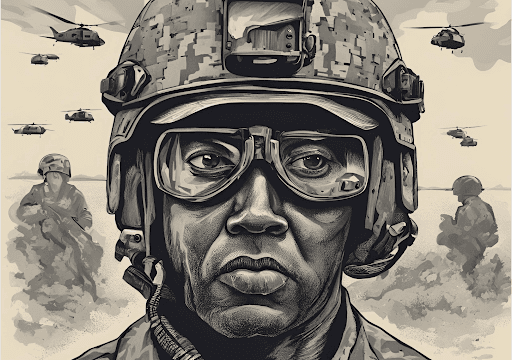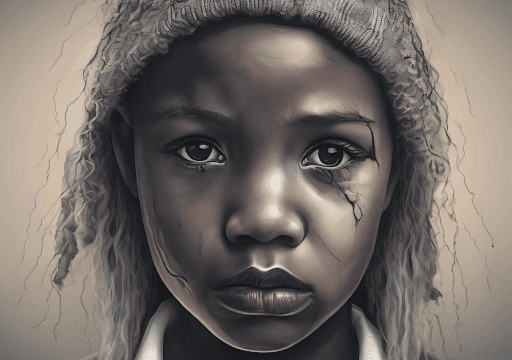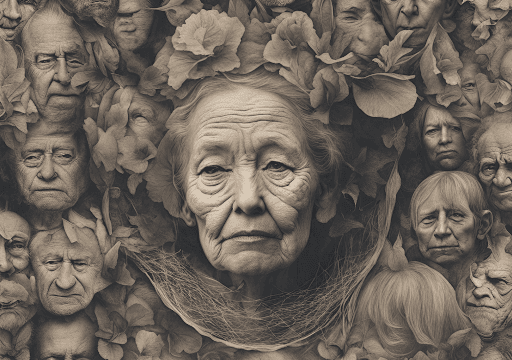In recent years, the word “trauma” has grown in popularity within pop culture, becoming a buzzword within multiple media platforms. Books on the topic have hit the New York Times best-sellers list, and with over 5,000 podcasts covering the subject, more and more people are reflecting on their own experiences with “trauma.” While Google searches for trauma have been creeping up throughout the years, the COVID-19 pandemic could very well be the culprit for this burst of interest in trauma. As more people took to social media, there has been a plethora of online therapists who’ve been sharing their expertise on the broad topic of trauma, making the information more accessible and more popular with the TikTok generation.
While trauma as a term can indicate such a broad spectrum of events—from physical injuries to emotional betrayals—certain types of trauma can have a far more profound impact. Major or large-scale traumatic events often affect not only the individuals who directly experienced them but also reverberate through subsequent generations, otherwise known as intergenerational trauma.
What is Intergenerational Trauma?
This phenomenon, known as intergenerational trauma, highlights how the echoes of past traumas can shape the lives and experiences of future generations. It is a term used to describe a sort of “passing down” of previous traumatic experiences to future generations, affecting their relationship skills, behaviours, and beliefs. To better understand this phenomenon, we can break it down into two types of intergenerational trauma: historical and collective.
Historical Trauma
Historical trauma encompasses the process of intergenerational trauma due to oppression related to culture, race, or ethnicity. Events such as the Holocaust are an example of historical trauma that is still able to affect generations long after.
Collective Trauma
Intergenerational trauma can be seen as a form of collective suffering that can be caused by extreme events or prolonged periods of stress and adversity. The 9/11 terrorist attacks, for example, impacted people all over the world.
Intergenerational trauma has the ability to surpass those who directly experienced the traumatic event, affecting generations of the same family for much longer than members realize. Therefore, understanding this concept is crucial for addressing the long-term effects of trauma and doing what we can to make sure it doesn’t transcend future generations.

How Does Intergenerational Trauma Develop?
Unfortunately, there are several events we can use to explain how intergenerational trauma occurs, but the actual study of intergenerational trauma began with a focus on Holocaust survivors and their offspring, revealing the profound impact of traumatic experiences across generations. In 1966, Canadian psychiatrist Dr. Vivian M. Rakoff published one of the first articles on this topic, emphasizing the critical dynamic between parent and child, which was then followed by subsequent research that concluded children of Holocaust survivors had high levels of psychological distress, which resulted in specific behavioural patterns such as excessive protectiveness towards parents, a need for control, an obsession with the Holocaust, and immature dependency. This research laid the foundation for understanding the impact and complexities of intergenerational trauma.
As understanding of intergenerational trauma evolved, researchers in 2010 began to examine its effects on Indigenous communities in Canada, particularly those impacted by the residential school system. This body of work established a clear link between adult survivors of trauma and the risk of child abuse or neglect. Many caregivers grappling with their unresolved trauma often struggle to be responsive to their children. Therefore, creating an environment where the child experiences a lack of essential support leads to self-regulation challenges and chronic symptoms of post-traumatic stress disorder (PTSD), perpetuating a cycle of complex trauma and disrupted attachment.
The ongoing effects of genocidal practices, colonization, and systemic racism are closely tied to intergenerational trauma. While these distressing events may seem unimaginable to you, look at the history of your parents, grandparents, and ancestors and ask yourself if they’ve experienced discrimination or abuse on a larger scale that may have affected their development and well-being. Although generations today may be far removed from these specific historical events, such as the Holocaust, tiny bits of traumatized behaviours can still trickle down the family tree, where the impact of personal trauma extends beyond the individual victim, affecting spouses and offspring alike. The ripple effect of victimization underscores the need for a deeper understanding of how multigenerational disruption influences healthy familial and cultural development. Intergenerational trauma is transmitted through shared family narratives, trauma dynamics, and cultural influences. Additionally, physiological changes resulting from trauma, such as heightened stress responses, can be inherited. Consequently, the effects of generational trauma can manifest without conscious awareness in current generations, appearing in various forms over time. Acknowledging and addressing these dynamics fosters healing and resilience across generations.
Here is a wide range of circumstances that can lead to intergenerational trauma:
- Colonization
- Enslavement
- Cultural genocide, such as the loss of language, culture, and traditions experienced by the Indigenous peoples of North and South America
- Forced migration, including the recently forced displacement of millions in Syria, Myanmar, and Ethiopia
- Separation of children from family members, including forced attendance at Indian residential schools and the more recent separation of children and parents at the United States-Mexico border
- War
- Famine and natural disasters
- Indoctrination into a cult or abusive and controlling religious organization
- Global or national crises, like the Great Depression
- Genocide and ethnic cleansing, including the Holocaust, Rwanda, and Cambodian genocide
- Experiencing or witnessing verbal and physical violence, sexual abuse, or emotional neglect
- Death, incarceration, or other loss of a parent
- Systemic racism, discrimination, or oppression
- Long-term financial hardship or poverty

What are the Signs and Symptoms?
It’s not always easy to recognize intergenerational trauma since many of the signs are descriptive of common mental health conditions like depression and anxiety. The signs and symptoms of intergenerational trauma are also very specific from person to person and family to family and, therefore, can widely vary.
“Some people become so accustomed to living with the impact of generational trauma in a family that accepts it as ‘normal,’ the trauma becomes normalized, and symptoms appear ‘normal’ to them,” says Canh Tran, LICSW, a trauma therapist in Seattle, WA. By normalizing our trauma symptoms, we can quickly begin accepting it as a regular part of our identity, making it even more challenging to recognize these symptoms.
Here are some general signs that you may have intergenerational trauma; however, these common symptoms can also be categorized into four main mental health concerns: depression, anxiety, PTSD, and psychological stress.
- Dissociation and depersonalization, or a sense of disconnection and detachment from your body and feelings
- Emotional numbness, or difficulty experiencing and expressing emotions
- Difficulty connecting with others, establishing trust, and forming relationships
- Feelings of isolation and withdrawal
- Feelings of shame, guilt, or low self-esteem
- A sense of helplessness or vulnerability
- Difficulty establishing personal identity
- Trouble regulating your mood and emotions
- A tendency to avoid certain people, places, or things
- Substance use, especially to help manage mood or emotional symptoms
- Nightmares
- Intrusive thoughts
- A diminished sense of security and safety in everyday life
- Feelings of anxiety and depression
- A heightened response to stress
- Thoughts of suicide, death, or dying
Depression
Depression is surprisingly and unfortunately heretic. According to Walter E. Nichols, a Professor at the School of Medicine at Stanford, has reported that around 50% of the cause of depression is genetic. Just as trauma can pass down from one generation to the next, so can depression.
Depression symptoms include:
- Prolonged feelings of sadness or hopelessness
- Loss of interest in activities
- Changes in sleep pattern
- Changes in appetite
- Constant fatigue or lack of energy
Anxiety
Anxiety may seem like an obvious symptom of intergenerational trauma, as the feeling of unease, worry, or fear can be traced back to the unresolved traumas of previous generations. Those affected by intergenerational trauma may experience heightened anxiety in everyday situations, hypervigilance, or a constant sense of impending danger, reflecting the lingering impact of their ancestors’ traumatic experiences. However, this type of anxiety can be particularly frustrating and confusing as it may be harder for individuals to identify a direct cause in their own lives.
Anxiety symptoms include:
- Excessive fear or worry
- Panic attacks
- Restlessness or difficulty relaxing
- Sleep disturbances
- Physical symptoms such as digestive issues and muscle tension
PTSD
You would think that Post-traumatic stress disorder (PTSD) is almost a direct translation of intergenerational trauma. However, these symptoms stem from inherited trauma rather than direct exposure. Descendants of trauma survivors, such as Holocaust survivors or war veterans, may exhibit a heightened vulnerability to developing PTSD in response to their life stressors, suggesting a biological or psychological predisposition passed down through generations.
PTSD symptoms include:
- Experiencing flashbacks/nightmares reliving the event
- Avoidance
- Hyperarousal
- Feeling isolated
- Negative changes in thoughts and mood (depression, anxiety)
Psychological Stress
Psychological stress is a pervasive and often overlooked symptom of intergenerational trauma, as the individual may not be aware as to why they’re experiencing physical symptoms, as their inherited DNA rather than a specific situation or conversation could be triggering those symptoms. In other words, intergenerational trauma can leave a “genetic marker” where individuals display symptoms of psychological stress without ever experiencing trauma firsthand.
Physiological Stress symptoms include:
- Muscle tension, especially in the neck, shoulders, or back
- Shaking or trembling
- Behavioural changes and mood swings
- Chest pain or rapid heart rate
Signs of Traumatization in the Original Trauma Survivors
Sometimes, it’s not easy to recognize the symptoms we may experience ourselves and analyze whether we’re exposed to intergenerational trauma. However, there are symptoms in those who’ve experienced the traumatic event and are unaware they are passing down these symptoms.
People who may be passing down Intergenerational Trauma may:
- Have difficulty discussing the trauma or may deny it altogether
- Minimize the traumatic experience (“It wasn’t so bad. Other people had it worse.”)
- Have trouble expressing emotions and communicating
- Use alcohol and other substances to numb or cope with unwanted feelings
- Raise their voice or become angry easily
- Have either an overly harsh or mostly uninvolved parenting style
How to Heal Intergenerational Trauma?
Healing from trauma is not easy; it takes a lot of dedication, patience, and compassion. As for Intergenerational trauma, there’s a need to break the cycle, and cycle breakers usually feel like the black sheep in the family or the odd one out because there’s a disconnect from what is considered normal or acceptable within a pre-established family dynamic. Some family members may resist acknowledging a traumatic event has happened and may refuse to discuss or communicate at all, while others are able to acknowledge it and are ready to begin healing.
1. Acknowledge and Understand Your Family Trauma
Awareness is often a crucial first step in the healing process. Recognizing and understanding intergenerational trauma involves learning your family history. In order to comprehend past traumas and their impact on future generations, you must identify symptoms in yourself and your family members, including inherited emotions and behaviours such as anger, sadness, anxiety, or substance abuse.
Providing a space or emotional landscape for open discussions with family members about the impact of trauma can further aid in healing and understanding, as it may be difficult for descendants to pinpoint issues they did not directly experience. Acknowledging trauma is not about glorifying or minimizing the experience; it is about authentically recognizing its reality and impact, which can then allow you to begin healing.
2. Process and Mourn
Once acknowledging the presence of intergenerational trauma, you must allow a grief period. Allowing yourself to grieve for the losses your ancestors experienced, such as their identity, sense of safety, loved ones, or homes, and recognizing that your ancestors may not have had the opportunity to process their losses fully can help you understand the depth of their experiences. Creating space to feel and acknowledge these losses with empathy and provide a blanket of healing. It is important to process trauma in different ways, as it can manifest differently from person to person. Stored trauma from your body and past generations may want to engage in physical movement, creative expression, laughter, and even crying to facilitate a release. These activities not only help you process your emotions but also allow the trauma to move through your body, also known as somatic healing.
3. Prioritize Your Health and Self-Care
Addressing trauma of any kind is incredibly taxing, so making overall health a priority is extremely important during the healing process. Basic things such as getting adequate sleep, maintaining proper nutrition, and staying hydrated can significantly influence your ability to cope with trauma and its symptoms.
4. Seek Support and Connection
Trauma can often feel very isolating; thus, connecting with others who have similar intergenerational experiences can be incredibly validating and helpful in your healing journey. Seek out support groups specifically focused on intergenerational trauma, as these can provide a safe space for sharing and learning. The support and validation you receive from others who truly understand your struggles can be a powerful tool in your healing process. However, it is equally helpful to confine in a friend or even take up journaling to help you get out your thoughts and feelings, as not everyone may understand exactly what you are going through.
5. Get Professional Help
All of this can feel like a huge weight on your shoulders; having a professional intervention is often necessary to fully address the deep-rooted nature of intergenerational trauma. Seek out therapists or counsellors who specialize in this area, as they can provide targeted strategies for healing. Professional treatment can guide you in avoiding past mistakes and changing behaviours that perpetuate trauma. Think of it as tackling the deep roots of weeds – it’s about going beyond surface-level issues to create lasting change, and sometimes, finding the deep roots can be difficult on your own.

Understanding and addressing multigenerational trauma is a challenging but crucial journey. By acknowledging past events and seeking appropriate treatment, you open the door to healing for your family and future generations. While we cannot change history, we have the power to shape a healthier future and break the cycle of inherited trauma.
Shyanne Anthony, a clinical therapist at Embark Behavioral Health, has a good point:
“As you focus on breaking the cycle of intergenerational trauma and changing the narrative, don’t forget to pick up your intergenerational wisdom.” Just as trauma can be passed down through generations, so can healing and resilience.
Our counsellors at An Elegant Mind Counselling are committed to supporting you on this transformative journey. Our range of services is designed to guide you toward healing from intergenerational trauma. Book a free 20-minute consultation to ask any questions and get started. Every step you take towards healing ripples through time positively impacts your present and your family’s future.
References:
Embark Behavioral Health. (2024, August 8). Intergenerational trauma: How trauma can be inherited. https://www.embarkbh.com/blog/trauma/intergenerational-trauma/
Intergenerational trauma and residential schools. The Canadian Encyclopedia. (2020, March 25). https://www.thecanadianencyclopedia.ca/en/article/intergenerational-trauma-and-residential-schools
King-White, A. D., King-White, D., & Fuller, K. (n.d.). Intergenerational trauma: How trauma passes down generations. ChoosingTherapy.com. https://www.choosingtherapy.com/intergenerational-trauma/
O’Neill, L., Fraser, T., Kitchenham, A., & McDonald, V. (2016, October 28). Hidden burdens: A review of Intergenerational, historical and complex trauma, implications for indigenous families. Journal of child & adolescent trauma. https://www.ncbi.nlm.nih.gov/pmc/articles/PMC7163829/
Raypole, C. (2022, April 20). Intergenerational trauma: What it is and how to heal. Healthline. https://www.healthline.com/health/mental-health/intergenerational-trauma#causes

